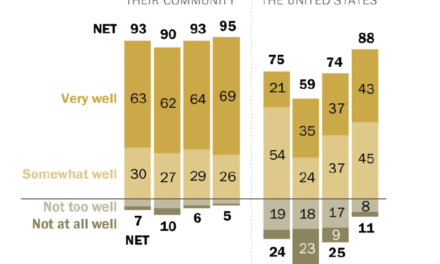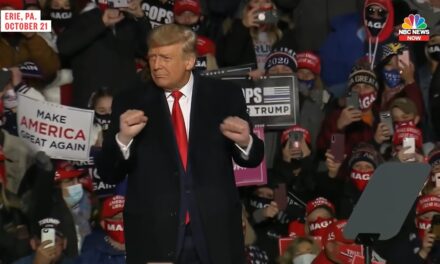We support our Publishers and Content Creators. You can view this story on their website by CLICKING HERE.
With a Republican governor and GOP supermajorities in the state legislature, it would be logical to assume that Wyoming has some of the most secure elections in the country — but that is simply not the case.
Despite Republicans’ dominance of state government, the Cowboy State has failed to adopt laws improving the integrity of its electoral system. This can be attributed to, in large part, resistance from liberal GOP legislators.
During last year’s budget session, for instance, members of the Wyoming Freedom Caucus (WYFC) attempted to pass legislation prohibiting private entities from funding election administration in the state. The bill sought to stave off the influence of “Zuckbucks” — monies given to local election offices by various left-wing nonprofits during the 2020 election that were ultimately used to the benefit of Democrats.
While the measure received effectively unanimous support upon its introduction, a GOP-run House committee voted to table the bill in an apparent act of retaliation against the WYFC, whose members voted down several establishment-backed bills introduced earlier in the session. The petty maneuver prevented Wyoming from joining the growing list of states (28) that have successfully banned or restricted private election funding.
[Exclusive: Wyoming Elections Chief Warns Local Officials Of 2024 ‘Zuckbucks’ Interference]
Now, with the WYFC having secured an outright House majority last year, Secretary of State Chuck Gray is seizing the opportunity to advance a prohibition on “Zuckbucks” and other overdue election measures in the Cowboy State’s upcoming legislative session. From proof of citizenship requirements to improvements to voter list maintenance, Wyoming’s elections chief is aiming to reshape the state’s election laws with reforms long supported by grassroots activists.
“This is a really comprehensive plan for us to move the ball forward [in Wyoming], and our administration is committed to advanc[ing] election integrity,” Gray told The Federalist.
The Agenda
Like many Republicans concerned about noncitizens potentially impacting U.S. elections, Gray maintained that ensuring only eligible Americans can register to vote and cast ballots is paramount in ensuring integrity in Wyoming elections.
The secretary detailed plans to advance legislation mandating prospective voters show proof of citizenship (POC) when registering to vote. A draft of the bill obtained by The Federalist lists several examples of acceptable POC, including a valid state-issued driver’s license or ID card “provided it does not contain any indication that the applicant is not a United States citizen,” a valid U.S. passport, a “certificate of United States citizenship,” and others.
According to Gray, if Wyoming Republicans are successful in implementing such requirements, it would make the Cowboy State the “only state in the union that has proof of citizenship for all races.” As The Federalist’s Matt Kittle previously reported, the U.S. Supreme Court issued a ruling in 2013 effectively prohibiting most states from requiring POC for federal voter registration under the National Voter Registration Act (NVRA).
In Arizona, for example, the state cannot deny someone the ability to vote in federal elections if they fail to show documentary proof of citizenship. Prospective Arizona voters must provide documentary proof of citizenship to vote in all races (including state and local), while those who fail to provide such proof but meet all other eligibility requirements are registered as “federal-only voters” and may only cast ballots in federal races.
Wyoming is one of six states exempt from the NVRA, which Gray argued gives state lawmakers the “opportunity” to require proof of citizenship for individuals seeking to register and vote at “every single [level].”
Wyoming has a chance to “truly be the leader on these conservative issues,” Gray said.
In conjunction with such requirements, Gray is also seeking to pass legislation mandating individuals provide proof of residency when registering to vote in Wyoming. As The Federalist’s Brianna Lyman reported, “Wyoming’s election code says voters must be both state residents and U.S. citizens … [b]ut would-be voters are currently just required to provide proof of identity.”
Gray previously put forward a series of rules instituting proof of residency requirements last year that were vetoed by Wyoming Gov. Mark Gordon. In his letter to Gray, the Republican governor argued that the secretary lacked statutory authority to alter election procedures without authorization from the legislature.
Referring to Gordon’s veto as “unfortunate,” Gray expressed hope the governor will do “the right thing” if a bill containing proof of residency requirements passes this year.
Gordon’s office did not respond to The Federalist’s request for comment on whether he would sign such a bill should it arrive at his desk.
Speaking of voter registration, Gray expressed interest in improving the state’s voter list maintenance procedures to ensure only eligible electors are on the voter rolls. This includes acquiring greater access to the Wyoming Department of Transportation’s data to “see when somebody requests a license in another state [to determine whether] there’s evidence that they move to another jurisdiction” and enhanced interaction with the federal government’s SAVE database to verify individuals’ citizenship status.
The secretary also described his desire to strengthen the state’s voter ID requirement. According to Ballotpedia, “Generally, voters are required to present a photo ID, but there are two exceptions to that requirement” — Medicare and Medicaid insurance cards — that are set to expire in 2029.
“We really want to remove those from the allowable list because they don’t have a photo on them,” Gray said. “One of the things you’re trying to effectuate with voter ID is [to stop] voter impersonation [and ensure] the person at the polls requesting the ballot is the person on the voter registration list. When you don’t have a photo, you can’t do that.”
Other items included in Gray’s 2025 agenda are prohibitions on ballot harvesting, ballot drop boxes, ranked-choice voting, and foreign funding in elections and ballot initiative campaigns. Implementing a “durational residency requirement to vote in Wyoming” and mandates for “[p]aper ballots, hand audits, and counts of elections” are also on the list.
Wyoming’s 2025 legislative session is slated to run from Tuesday to March 6.
Shawn Fleetwood is a staff writer for The Federalist and a graduate of the University of Mary Washington. He previously served as a state content writer for Convention of States Action and his work has been featured in numerous outlets, including RealClearPolitics, RealClearHealth, and Conservative Review. Follow him on Twitter @ShawnFleetwood

 Conservative
Conservative  Search
Search Trending
Trending Current News
Current News 





